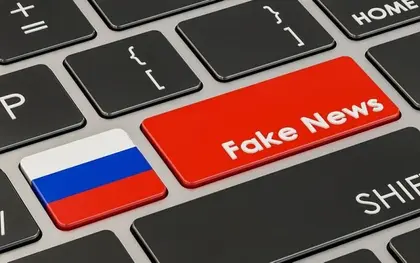The Russian Federation will seek to lower Pres. Volodymyr Zelensky’s international support through a series of well-planned provocations, according to the Ukrainian defense ministry’s main intelligence agency.
In social media on Thursday, the agency wrote that the Russian presidential administration has approved a plan to create an additional structure in Russia, that will be aimed, specifically, at discrediting the Ukrainian president via diverse disinformation campaigns. The disinformation campaign would be targeted to people who live in western Europe, with the hopes of dissuading them from supporting Ukraine by changing the public perception of the president.
JOIN US ON TELEGRAM
Follow our coverage of the war on the @Kyivpost_official.
The Russian plan, according to the agency, would involve the launching of a website posting content produced by Moscow called the “Zelensky Fund.” The website itself has already been registered, said the bulletin.
The Russians’ next step would be to seek the registration of the “Zelensky Fund” across Europe and would attract public attention via a large-scale, pan-European advertising campaign.
The fund’s principal activity would apparently be analogous to that of a pyramid scheme, or multi-level-marketing, where people gain rewards for bringing more people into the scheme.
“This is nothing new. Russia has been seeking to discredit Zelensky for a very long time. The Kremlin understands that the best way to appeal to the Western audience is through their value-based system. Thus, Moscow has been emphasizing Ukraine’s corruption intensively since February, and then it has launched another campaign that Ukraine was selling weapons on the black market,” said Ivana Stradner, a Washington-based expert on Russian disinformation.

N. Korean Troops Massed in Russia to Enter Ukraine War ’Soon’: Pentagon Chief
The expert continued that, “Russia is threatened by the Western support of Ukraine. Although Moscow cannot stop the shipments of HIMARS, it can always resort to its well-known disinformation campaign to discredit Zelensky.” That’s why “it is important to pre-emptively counter Russian narratives by exposing Moscow’s disinformation intentions in advance,” said Stradner.
In the former Soviet states, multi-level marketing is often associated with Ponzi schemes, where one person’s buy-in finances the dividends of someone who joined the scheme before him. As long as more people join, people continue to profit from being a party to the deal. However, should membership decline, the structure is unable to sustain itself or to continue financing dividends – and thus collapses.
The well-known MMM Ponzi scheme had activities across the former Soviet states before being closed by Russian authorities in 1994. Before the scheme’s eventual demise, MMM had successfully fleeced five to ten million people of their life savings. MMM, which relied heavily on television advertising, had promised an annual rate of return of 3,000% for every ruble invested. The founder, Sergei Mavrodi was sentenced to prison for his actions establishing the fake organization. As a result of the catastrophic outcomes, then-Russian-president Boris Yeltsin pushed through post-Soviet Russia’s first laws against false and/or deceptive advertising.
You can also highlight the text and press Ctrl + Enter






